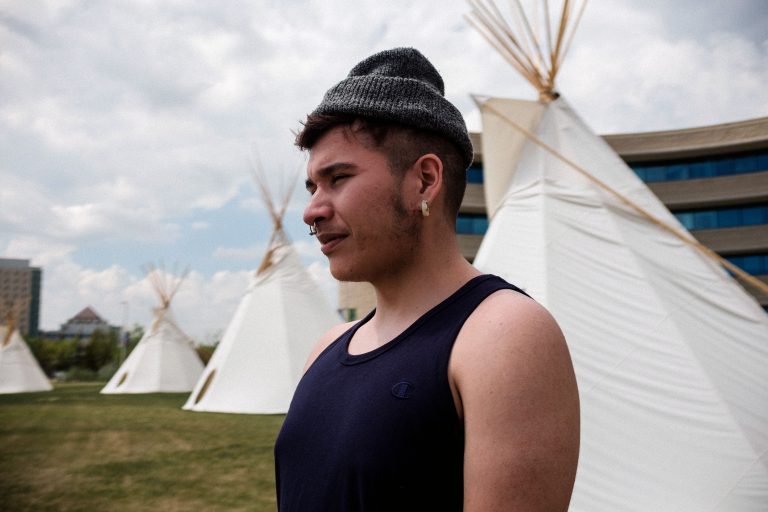Memoir and biographies are some of my favorite genres to read. When I experienced a profound loss about eight years ago, I found that reading the intimate details of other people’s lives was more comforting than typical escapist reading. For this reason, I approached Billy-Ray Belcourt’s third book, A History of My Brief Body, with excitement. Belcourt is from the Driftpile Cree Nation in Alberta, and now lives in Vancouver, B.C., where he is an assistant professor in the creative writing program at the University of British Columbia. His previous book of poetry This Wound is a World was awarded the 2018 Griffin Poetry Prize, which made him the youngest winner in the prize’s history.
In his new book, Belcourt ingeniously plays with and entangles his own story into the intellectual work of other thinkers. Queer and Indigenous philosophers have had lasting impacts on the ways that we think about ourselves in certain moments in history, and Belcourt’s work is no different. He is able to seamlessly bring in the works of Michel Foucault, Maggie Nelson, Jill Stauffer, Sianne Ngai, Bhanu Kapil, and Leanne Betasamosake Simpson, to name a few. At first, I was taken aback by this writing style, because it was so completely different from what I have grown to expect from memoir writing. If you are picking up this book because you are interested in an autobiography or a memoir that follows genre conventions, this is not the book for you. But if you stay with this book you will see how the thinkers and writers who come before us can begin to interlace with our own intimate histories.
Despite his engagement with Indigenous philosophers and critical theorists, I still found Belcourt’s work very approachable. I’m a librarian, but I’m not one of those librarians who came into this job after an English degree (or two). When I pick up a new work of poetry, it is with a great deal of anxiety; I wonder if I will be able to understand it or not. I also consider myself to be a recovering academic, so I’m not used to thinking deep and moving thoughts these days. This was especially true when I read Belcourt’s book during the global lockdown triggered by the coronavirus last spring. The constant terrible news made it difficult to concentrate for a long time.
Belcourt’s writing includes seamless transitions between personal narrative and scholarly writing. In doing this, Belcourt creates his own genre that blends and bends poetry, narrative, memoir and philosophy all at once. It is written in a way that is easily digestible, so if you, like me, are highly distractible these days, then this book is also for you. The work is divided into shorter pieces that are related, but not in linear fashion. These essays are varied in length and can at times read like poetry. Particularly, the chapter titled “Gay: 8 Scenes” allows for us to get eight different glimpses into his experiences from teenager to young adult to current day, each leaving one with a new feeling.
Much of this writing is about queer love and experience on the Prairies. In one passage, Belcourt writes: “Grindr morphs into something of a geography of anxiety. Our bodies — possibly contagious, possibly spoiled by the sign system of race — are disavowed, again and again.” Ideas about collective trauma and anxiety are being discussed more openly today. This past year has seen an uncovering of the racism that exists in many communities, especially the racism within queer communities. Belcourt’s work sheds light on the racism that exists within queer communities on the Prairies. A History of My Brief Body is an honest portrayal of the traumas and anxieties that have plagued queer NDNs for centuries.
Towards the end of the book, Belcourt engages with a more contemporary timeline of both queer and Indigenous traumas. This includes the verdict of the Gerald Stanley trial, the police mishandling of Bruce McArthur’s crimes in Toronto and the Pulse nightclub shooting. All of these events have their own, more localized audiences to answer the question of “where were you when?”
It floored me to read Belcourt’s recount where he was when the verdict came down in the Stanley trial. I was at the same book club event, and the immediate and deep feelings of such grief in the room could not be avoided. It was during a brutal cold snap across the Prairies; and it was in a well-known independent bookstore in Edmonton called Audrey’s. Just like the cold that seemed to linger everywhere, the results of the Stanley trial were also inescapable. It was like we could all feel collective sadness and rage in the air too. Reading about that night again made me realize that certain facets in “our society”; in this case queer NDNs, will have completely different cultural markers of a collective trauma.
Belcourt’s book is described as a “profound meditation,” and this felt to me like a very accurate description. Belcourt powerfully points to the ways that both intimate events and those that occurred outside of our lifetimes can influence the way we think about our lives going forward. Reading A History of My Brief Body in a moment of suspension that was unplanned and unwilling, the book gave me a chance to stop and think about what has continued to impact my body and my life, for the brief moment that it will exist in. Belcourt’s writing is brilliant, deeply moving and smart. It is a thought exercise that will have a lasting impact on contemporary Indigenous writing.
Sheila Laroque is a Métis librarian from Saskatoon in Treaty 6 Territory. She has recently moved back home and is now working with Saskatoon Public Library. She is also the co-host of a podcast called masinahikan iskwêwak; or Book Women. She tweets @SheilaDianeL.
Image: Tenille Campbell



